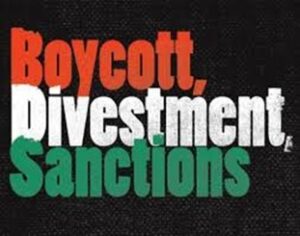CSIP: PRELIMS BOOSTER SERIES – 274 INTERNATIONAL RELATIONS
BDS MOVEMENT
Why in news:
An article published in a German newspaper last week accused Indian poet and curator Ranjit Hoskote of “anti-Semitism” and sympathising with the BDS (Boycott, Divestment, Sanctions) movement. Hostoke then resigned from the Finding Committee for Documenta 16, the 2027 edition of one of the world’s most prestigious art exhibitions that is held in Germany, over the accusation

BDS Movement Overview
- Initiated by Palestinian groups in 2005 for global support in securing Palestinian rights.
- Aims to combat discrimination, including anti-Semitism and Islamophobia.
- Draws inspiration from the anti-apartheid movement in South Africa.
BDS Goals
- Calls for nonviolent pressure on Israel to adhere to international law.
- Demands an end to occupation, equality for Arab-Palestinian citizens, and the rights of Palestinian refugees.
- Targets boycotts, divestment from violative institutions/companies, and sanctions on governments supporting Israeli policies.
Specific BDS Tactics
- Focuses on boycotting Israeli-affiliated entities violating Palestinian rights, e.g., Puma’s sponsorship of Israel’s football in disputed territories.
- Divestment campaigns urge withdrawal of investments from Israel by various institutions.
- Sanctions aim to compel governments to take action against Israeli apartheid.
Israeli Government’s Stance on BDS
- Netanyahu links BDS to anti-Semitism, accusing its founders of seeking the end of the Jewish state.
- Israel sees criticism as a threat but BDS defends its stance, distinguishing criticism of state actions from anti-Semitism.
Economic Impact and Challenges
- Few brands and celebrities have boycotted Israel, but the overall impact on the state’s economy is unclear.
- BDS views itself as a potent force in ending western support for Israeli policies but acknowledges entrenched support for Israel.
For more information: https://bdsmovement.net/

